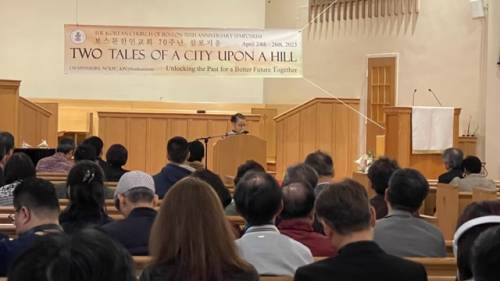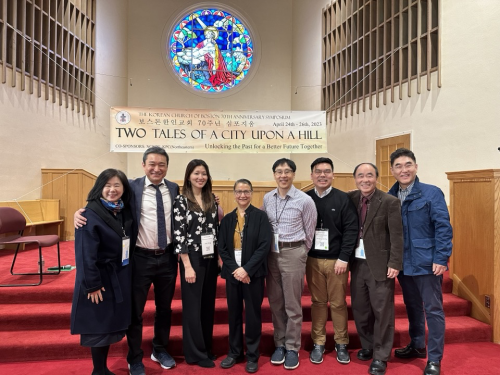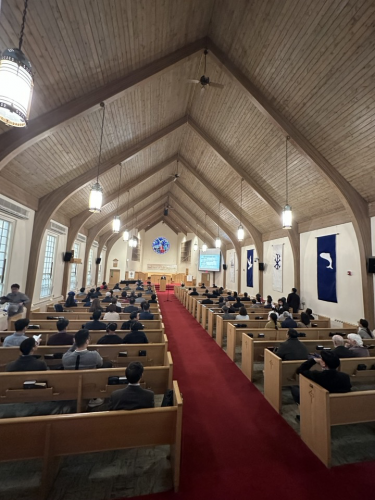When the Korean Church of Boston Started Its Story of 70 years With the Stories of Native Americans.

When a Korean-American church celebrates its 70th year anniversary by opening with a Native American (Elona Street-Stewart – co-moderator of the 224th General Assembly) telling the story of her people in Turtle Island thousands of year before it became United States, the destruction that came with Christian Mission in Turtle Island, and the impossible gospel-bloom from the dust – (the storyteller is a Christian Native American!) — the lens you wore to see the world gets knocked off your nose. At first, it’s difficult for your brain to adjust. It all seems darker, but it’s not. You are seeing more depth; you are seeing better. Here are a few of the thing I saw/learned while participating/facilitating in the conversation the Korean Church of Boston opened.

-
- That the great protestant missionaries to Korea, Horace Allen and John Heron, almost quit because they couldn’t stand each other. They forsook their American privilege and comfort to live in a foreign land, but it was personality difference that could have had us in an alternative timeline where there’s no church in Korea (a bit of an exaggeration). They could stand Korean humidity but not each other. In their letters to the Mission Board, they called each other “assholes.” What does this have to do with my first point about starting the story with the Native American story? We’ll get there (it’s all connected) but come on, this is juicy gossip! This is the first thing you would talk about at the water cooler, “did you hear what Allen called Heron?! And what Heron wrote back?!” Gossip almost ruined the gospel (isn’t every church at such precipice?). It’s humbling and emboldening to know that the gospel can bear fruits from people who were ready to call it quits over quibbles. So, if they brought in a fragile ego, then what else did they bring with their gospel?
-
- American imperialism. A little known war, the Korean Expedition of 1871, cracked open Korean ports. Six hundred plus American soldiers invaded, culminating in the Battle of Ganghwa, where 200+ Korean troops and only three American soldiers lost their lives. Six years later, the Japan-Korea Treaty of 1876 finally ended Korea’s isolation. So, when Koreans saw American missionaries, they saw America first: those ships, guns, and medicine. Koreans were in awe, in both senses of the word. They knew the American military can impose their will. They also knew American missionaries came with Western medicine, which had a higher success rate than their medicine and herbs, so it was powerful magic to them. There was no parity in that relationship.Did the missionaries know that?
Complicating this story (be wary of simplistic stories) is Japan’s annexation of Korea in 1910. Japanese imperialism, modeled after European powers, pushed up, confronted, sidled up with American imperialism. American missionaries advocated for Korea’s pursuit of self determination at the Paris Peace Conference. When these efforts failed, American missionaries supported the March 1, 1919, Samil Movement. An aspect of America’s imperialism served as opposition to Japanese’s violent attempt to erase Korean history and identity.
- American imperialism. A little known war, the Korean Expedition of 1871, cracked open Korean ports. Six hundred plus American soldiers invaded, culminating in the Battle of Ganghwa, where 200+ Korean troops and only three American soldiers lost their lives. Six years later, the Japan-Korea Treaty of 1876 finally ended Korea’s isolation. So, when Koreans saw American missionaries, they saw America first: those ships, guns, and medicine. Koreans were in awe, in both senses of the word. They knew the American military can impose their will. They also knew American missionaries came with Western medicine, which had a higher success rate than their medicine and herbs, so it was powerful magic to them. There was no parity in that relationship.Did the missionaries know that?
-
- Mission work in Asia rode the wave of America’s imperialist expansion into Asia; and this expansion was an extension of America’s expansion into the “Western frontiers” and “Christianization” of Native Americans. The theology of Manifest Destiny, a policy with religious rhetoric and a theology with direct policy mandate, is what arms the American military as well as inspires and informs Christian mission. This continuity is not in theology only but in logistics. Historians, like Walter Williams, connect the annexation of the Philippines after the Spanish-American War in 1898/1899 back to the US Indian policy before the 1890s. Philippine colonial administrators applied lessons from US Indian policy. The first four military governors of the Philippines had extensive employment in Indian affairs. And the structures of the two government agencies were similar.There is always more to a story.
The Presbyterian missionary Horace K. Allen brokered a deal between Hawaii sugar planters and King Kojong that opened the door for the first major wave of Korean migrants between 1903 and 1905. Hawaii sugar planters opened the door for the first Korean immigrants because Chinese Exclusion laws had cut off the supply of Chinese workers. They needed new exploitable labors. There is always more to a story.
- Mission work in Asia rode the wave of America’s imperialist expansion into Asia; and this expansion was an extension of America’s expansion into the “Western frontiers” and “Christianization” of Native Americans. The theology of Manifest Destiny, a policy with religious rhetoric and a theology with direct policy mandate, is what arms the American military as well as inspires and informs Christian mission. This continuity is not in theology only but in logistics. Historians, like Walter Williams, connect the annexation of the Philippines after the Spanish-American War in 1898/1899 back to the US Indian policy before the 1890s. Philippine colonial administrators applied lessons from US Indian policy. The first four military governors of the Philippines had extensive employment in Indian affairs. And the structures of the two government agencies were similar.There is always more to a story.
-
- Where do you begin a story? Mark starts the story of Jesus with Jesus’ baptism. Matthew and Luke say it starts before, with the birth of Jesus. John outdoes them both. It starts with creation. Where you start matters to the meaning of the story. Where you start is determined by what story you want to tell about yourself. If you want to know how the Korean American churches both challenge and perpetuate unjust power dynamics, go way back. Way back when this land was Turtle Island. Before Native Americans had the need to be called Native Americans. When their identities started simply with “the people.” What happened when Christians came to Turtle Island? That is the only way you can understand the American Church story.
-
- The stories above do not vilify the protestant missionaries or their mission work. These stories just keep us honest; that our history is not a Marvel Universe story of heroes and villians. But it is a gospel story of God’s faithfulness to humans in their broken world. Our saints are sinners, which does not make us any better. We just have to approach our work in the humble posture of repentance. These stories correct our self-righteous myopia, so we can see how desperately we need God, for “all have fallen short of the glory of God.”These stories are for us.How does God work salvation amid the compromises of the gospel? What other stories must we stop suppressing to tell the story of God and not the story of our self-righteousness?
-
- Preston Hughes tells of how some white churches leaving a city in Georgia because of its integration, mythologizes the story of their leaving as obedience to Christ. “We went because Jesus told us to go.” That story does not tell the gospel story.
-
- I am a Korean-American Christian decolonizing the faith I was gifted from an American seminary and my Korean parents. I remember the dawn prayer meetings, the Wednesday bible studies, the Korean hymns my mother sang for me as a kid. They still shape my life. I do not want to lose them. They have given me hope and rescued me often. They are just being reformed, by being reframed in a larger story.

- I am a Korean-American Christian decolonizing the faith I was gifted from an American seminary and my Korean parents. I remember the dawn prayer meetings, the Wednesday bible studies, the Korean hymns my mother sang for me as a kid. They still shape my life. I do not want to lose them. They have given me hope and rescued me often. They are just being reformed, by being reframed in a larger story.
So as you prepare for your next church anniversary, ask yourself: Where should we start this story? What story are we not telling? Because you don’t want to be suppressing the story of God.
Samuel Son is Manager of Diversity and Reconciliation at Presbyterian Mission Agency. You can find more of his writings here.